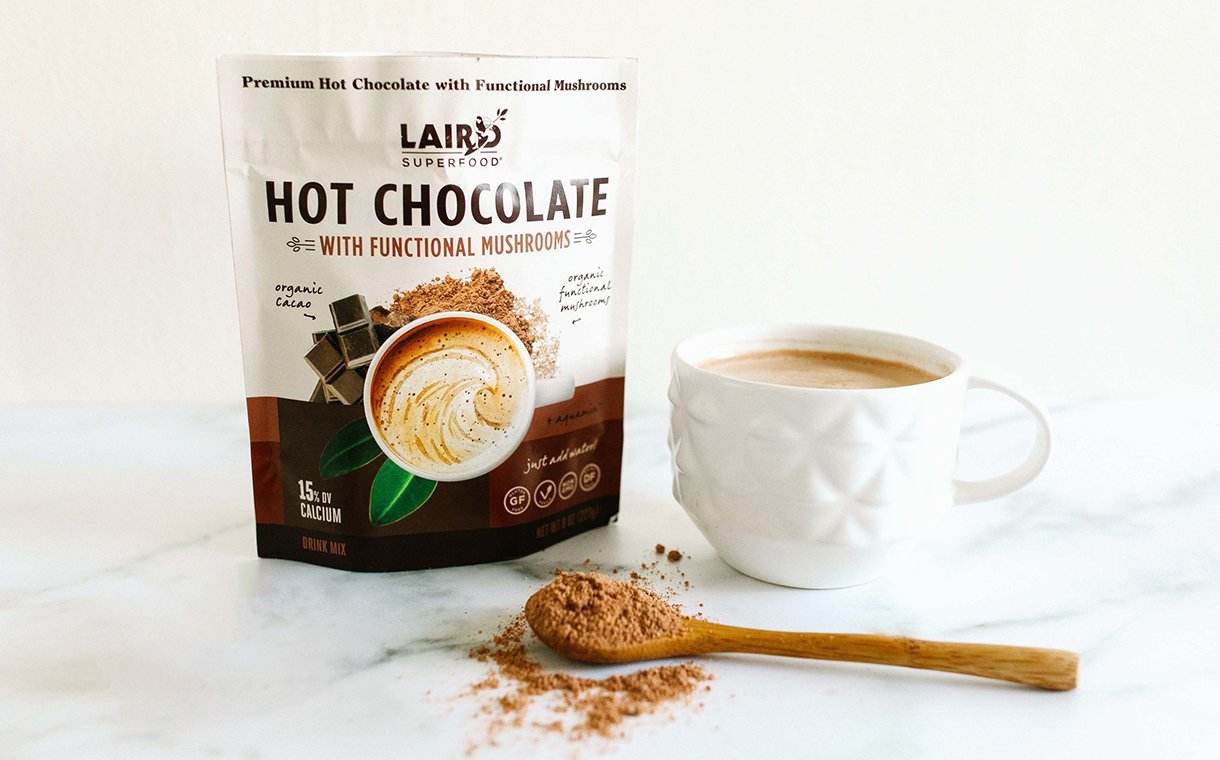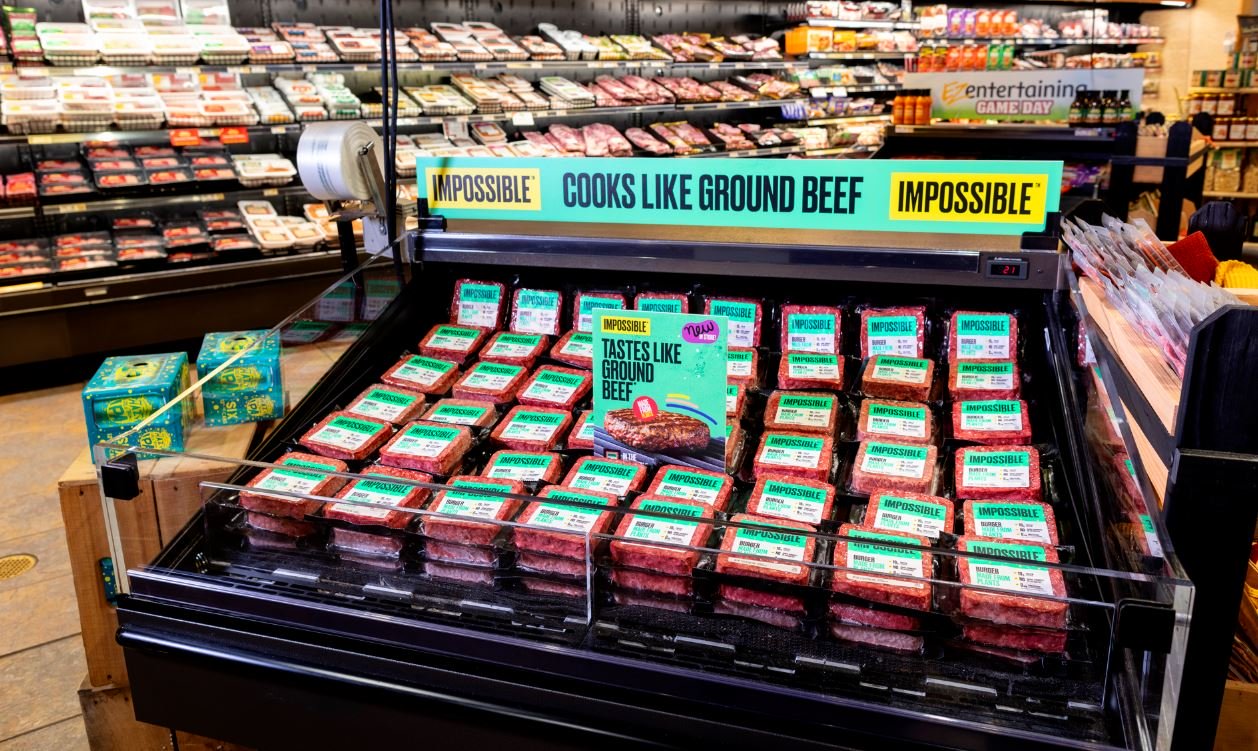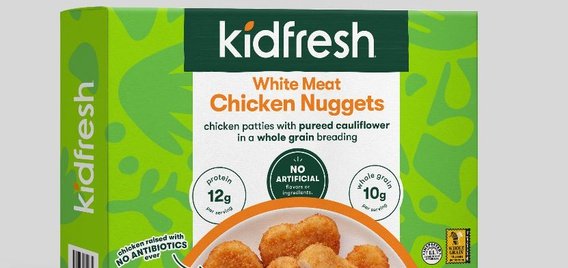Even as millions of people around the world have become ill from the coronavirus, the pandemic has simultaneously acted as a catalyst to encourage more consumers to eat healthier, with plant-based meat and immunity-boosting products among the biggest beneficiaries.
“As people kind of start building up these new behaviors, they’re looking for more,” Joan Driggs, vice president of content and thought leadership at marketing research firm IRI, told Food Dive. Consumers want “an experience around whatever it is they’re adopting too, whether it’s high protein, whether it’s low carb, whether it’s one of those specialty diets.”
Driggs said early during the pandemic people sought products that boosted their immunity and flocked to vitamins, minerals and other healthy ingredients such as mushroom supplements and elderberry. They also sought items that helped relieve anxiety, including melatonin for a good night’s sleep.

Laird Superfood
The better-for-you behavior extended even further into the home through food. While initial pantry stocking included a lot of staple items, such as rice and pasta, shoppers soon turned to fresh ingredients, like potatoes, fruits and vegetables, to incorporate into them, Driggs said. The push to eat healthier also has added momentum to trendy diets like Whole 30, keto or paleo.
As people strive to eat healthier, the behavior has moved into other aspects of their lives. New Hope found during the quarantine that consumers are spending more time walking, running, biking, doing yoga online or at-home exercise videos. Only 19% of those surveyed said they aren’t doing any exercise. And Beneo, a supplier of functional ingredients derived from chicory roots, beet sugar, rice and wheat, estimated 75% of consumers globally said they plan to eat and drink healthier as a result of the pandemic.
“[The shift in consumption patterns amid the pandemic] is a factor that will be hard to ignore when looking into new product development,” Andreas Herber, executive board member at Beneo, told FoodIngredientsFirst. “However, this also means it’s not so much about new ideas — it’s about exploring ways to strengthen and improve existing solutions, such as natural and organic products, as well as those with functional or health benefits.”
Meat industry gets grilled
The coronavirus has been particularly taxing on the country’s meat industry where thousands of workers have gotten sick and dozens of processing plants have shut down, prompting shortages at grocery stores and a spike in prices.
While meat has struggled, the industry’s challenges have been a boon for their plant-based counterparts like Beyond Meat and Impossible Foods. These and other faux burger makers also have benefited when grocers ran out of burgers, pork chops and steaks or quantities were limited, in some cases prompting consumers to try these products for the first time.
“We’ve seen a number of trends that will last and one of them clearly is a concern about personal health.”
Hanneke Faber
President, Unilever’s foods and refreshment division
Sales of plant-based meat were already on an upward trajectory before the outbreak as more consumers cut meat out of their diet altogether or curtailed their overall consumption. According to SPINS data reported by the Good Food Institute and the Plant Based Food Association, sales of plant-based meat were up 18% last year, with the category worth more than $939 million.
Rachel Konrad, the head of communications at Impossible Foods, told Food Dive while values such as sustainability, treatment of animals and impact on the environment have all played a major role in increasing demand for plant-based meat, health is playing a more meaningful role in drawing people to the category.
“Public health, individual heath is going to really start to become a growing driver of awareness and interest in the product,” she said. “The fact that we’re living through these extraordinary times is actually just accelerating some of the important trends that you’ve been seeing, that have been happening for a few years now.”

Impossible Foods
Impossible, which has been selling its burgers in restaurants since 2016, only started offering the product on grocery store shelves last September. In early March, it was in 150 locations. Now, they are in more than 3,000 stores like Kroger, Safeway and Albertsons after accelerating its rollout following a surge in demand from consumers and interest from grocery chains. The California company also decided to introduce its direct-to-consumer platform earlier this month, several months ahead of schedule.
“We are selling everything we can make,” Konrad said. “There is pent-up demand for it.”
Traditional CPG food manufactures also have seen a sizable uptick in demand for their products, including less-than-healthy nostalgic foods like soup and macaroni and cheese, especially early on during the pandemic as consumers stockpiled at home. Still, executives told Food Dive a major beneficiary of the surge in sales has come in healthy foods, which they expect to linger after the current pandemic has abated.
“Even within those overall higher sales those products that specifically focus on human health, especially immunity, but also heart health in the U.S. [with products like] Lipton, have been particularly popular,” Hanneke Faber, president of Unilever’s foods and refreshment division, told Food Dive. She said sales of its Lipton with Immune Boost have been “flying off the shelves” during the pandemic.
“We’ve seen a number of trends that will last and one of them clearly is a concern about personal health,” Faber said.
Takoua Debeche, vice president of research and innovation at Danone North America, also noted the company has seen an uptick in many of its wellness-focused products such as its probiotic offering with Activia Dailies or its lower-sugar brand Two Good.
As the pandemic was worsening, consumers were looking into its plant-based offerings like Silk or So Delicious. She said the company actually benefited from consumers looking at plant-based offerings to proactively support their health and well-being. At the same time, more consumers are trying their soy, almond or oat-based products when staples were wiped clean from shelves.
“We are seeing people are consuming more at home and are consuming in a healthy way, which I think is very relevant for the type of categories we are playing in,” Debeche said. “Anything that is linked with healthy, mainly plant based, still is holding very strong, so that could have a good indication that this part of the new normal will go even further.”
New health and consumption habits
At AF Ventures, a private equity firm investing in nearly three dozen better-for-you food and beverage upstarts, the coronavirus has only elevated consumer interest in functional foods produced by its companies that reduce the risk of disease and promote good health, Jordan Gaspar, a managing partner at AF Ventures, told Food Dive.
Gaspar said with more people working from home it has created interest among parents to not only be more mindful of the food they feed themselves but what they are giving their children during meals like lunch that may not have been as top-of-mind in the past when kids were at school. This shift has been especially beneficial for companies AF Ventures has invested in like plant-based manufacturer Alpha Foods and Kidfresh, a maker of chicken, pizza, quesadillas and other foods embedded with vegetables.

Permission granted by AF Ventures
“This is sort of the beginning of what will be a period of people really adjusting to new health and consumption habits,” Gaspar said.
According to a study released in March 2019 by Kerry, 65% of consumers seek functional benefits from their food and drink. The top five ingredients perceived to deliver these kinds of benefits were omega-3s, green tea, honey, coffee and probiotics.
For food companies, most notably large CPGs desperate for ways to rejuvenate sales and profits, functional foods could be a lucrative way. Zion Market Research estimated the global functional ingredients market was worth $64.9 million in 2018, and is expected to reach nearly $100 million by 2025.
“So many people are taking this time to commit to their personal wellness. People are trying to adopt new, healthier behaviors, more exercise. Trying to eat more healthy foods,” Driggs said. “It’s not going to go away.”


